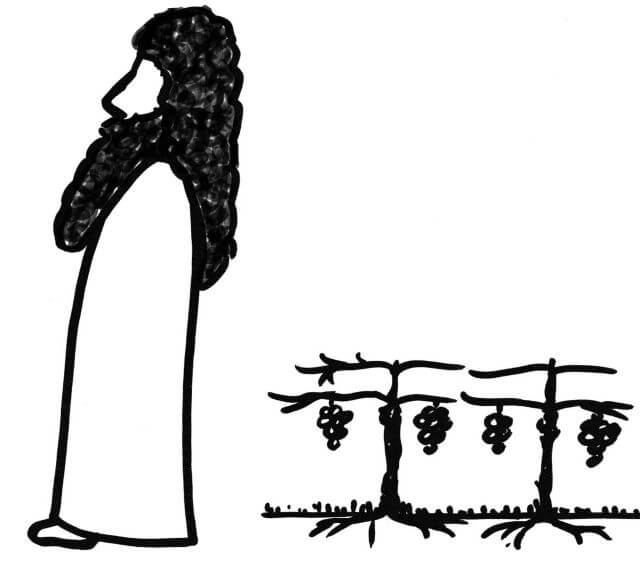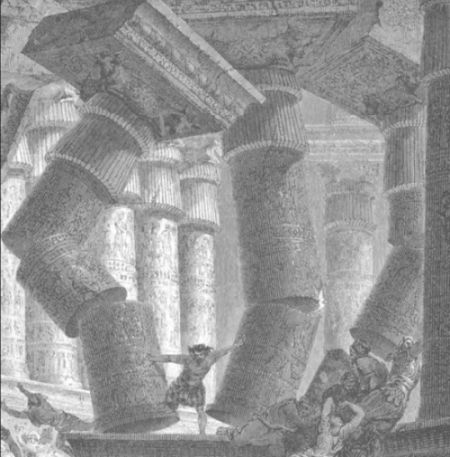CHURCH 03 - Spiritual Leadership OT: Nazirites
Num 6:1-21 Instructions concerning a Nazirite vow
The LORD spoke to Moses, saying: 2 Speak to the Israelites and say to them: When either men or women make a special vow, the vow of a nazirite, to separate themselves to the LORD, 3 they shall separate themselves from wine and strong drink; they shall drink no wine vinegar or other vinegar, and shall not drink any grape juice or eat grapes, fresh or dried. 4 All their days as Nazirites they shall eat nothing that is produced by the grapevine, not even the seeds or the skins.
5 All the days of their nazirite vow no razor shall come upon the head; until the time is completed for which they separate themselves to the LORD, they shall be holy: they shall let the locks of the head grow long.
6 All the days that they separate themselves to the LORD they shall not go near a corpse. 7 Even if their father or mother, brother or sister; should die, they man not defile themselves; because their consecration to God is upon the head. All their days as nazirites they are holy to the LORD.
- Anyone can take the oath, man or woman, priest, Levite or normal person.
- It seems the length of the vow is variable, but once committed to, it must be fulfilled.
- It is emphatically a vow of the willing, the voluntary, the self-motivated, the self-initiative, those drawn to God. Their is no obligation to do this.
- In that sense it is fundamentally different from being a priest or Levite (inherited by bloodline) or being a prophet (by God’s calling). It is a spiritual state, function or role that is of a different nature.
- The Nazirite vow allows the common people to be like a priest. It is the voluntary version of ‘being set apart’. Nazirites have to keep some of the rules a priest has to keep (concerning defiling), in some regards the rules are more strict than those pertaining to priests (no wine, vine products)
- The rules are strict, as they also are for priests: though voluntary, it is emphatically a serious business. If embarked upon it must be completed.
- In that sense it acts like a normal vow, oath, promise: I don’t have to make one, but if I make one I have to keep it.
- Nazirites are “holy to the Lord”. The same words are inscribed on the high priest’s crown (Exo 29:6, 39:30, 8:9, Lev 21:12). It is a very honorable state, and a solemn one.

Num 6:9-12 Interruptions of a Nazirite Vow
If someone dies very suddenly nearby, defiling the consecrated head, then they shall shave the head on the day of their cleansing, on the 7th day they shall shave it. 10 On the 8th day they shall bring two turtledoves or pigeons … the priest shall offer them as sin offering and burnt offering, and make atonement, because they incurred guilt by reason of the corpse. They shall sanctify the head the same day, 12 and separate themselves to the LORD for their days as nazirites and bring a male lamb … as guilt offering. The former time shall be void because the consecrated head was defiled.
- This is a provision for an accidental defilement (intentional ones are not allowed).
- The procedure is solemn and reinforces the seriousness with which a Nazirite vow is seen. The time is counted again from zero, the former days of consecration are disregarded. This seriousness again is priest-like, solemn, honorable and placing importance on the free-will gift given.
Num 6:13-212 Termination of a Nazirite vow
This is the law for the nazirites when the time of their consecration has been completed: brought to … tent of meeting, 14 … offer gift, one male lamb … as burnt offering, one ewe lamb a year old as sin offering, one ram as an offering of well-being, 15 and a basket of unleavened bread, cakes, unleavened wafers… with their grain offerings and drink offerings. … 18 Then the Nazirite shall shave the consecrated head at the entrance to the tent of meeting .. put hair under the sacrifice of well-being … 19 ram’s shoulder, one unleavened cake and waver in the palms of the Nazirite … 20 then elevated as elevation offering … After that the nazirite may drink wine. 21 Their offering must be in accordance with the nazirite vow, apart from what else they can afford.
- Burnt offering (signifying dedication, consecration, surrender), sin offering (acknowledging fallenness) and well-being offerings (fellowship with God) are offered in this sequence, a solemn yet joyful occasion.
- The hair, the sign of the consecration is co-offered, not with the burnt offering (our consecration is incomplete), nor with the sin offering (human effort cannot make holy), but with the fellowship offering, since this vow expresses a willing communion with God.
- Again the seriousness is stressed: No poor-option with these sacrifices, though more can be given free-will.
Nazirites in history

- Samson, son of a godly couple (Manoah and wife), called by God to be a Nazirite for life, set apart from before birth to be a Judge-Deliverer for Israel (Jdg 13:5-7). He divulges his Nazirite vow to Delilah, who promptly has him shworn (Jdg 16:17), de facto breaking his Nazirite vow. His strength leaves him.
- Samuel was a Nazirite from birth. In return for the request for a male child his mother Hannah promises ‘I will set him before you as a nazirite until the day of his death. He shall drink neither wine nor intoxicants, and no razor shall touch is head’ (1 Sam 1:11).
- Ezekiel does enacted symbols with his hair (Eze 5:1-17), but it doesn’t seem to be connected to a Nazirite vow.
- Paul seems to have taken a time-limited Nazirite vow upon leaving Corinth at the end of his 2nd missionary journey (Acts 18:18). At the end of the 3rd missionary journey, when he is in Jerusalem, James suggests to Paul to join and pay for the final sacrifices (?) for four men under a vow, presumably a Nazirite vow (Acts 21:23-24). Either Paul remained a Nazirite this long (52-57 AD), or he did so several times. Is seems the other four men (probably members of the church also) had also taken Nazirites vows. The sacrifices mentioned would also fit normal votive offerings, but the mention of hair points towards Nazirite vows.
Word study around the concept 'Nazirite'
Nazirite H 5144 ‘nazir’ 10x in the OT
Meaning: to separate, to be separated, consecrated (as prince, a Nazirite); hence (figuratively from the latter) an un-pruned vine, unshorn Nazirite. (The translation, Nazirite, is by a false alliteration with Nazareth)
- Lev 15:31 “separate Israel from their uncleanness”
- Lev 22:2 “priest to separate themselves from holy things”
- Num 6:2 “separate themselves unto the LORD”
- Num 6:3 “separate himself from wine, strong drink”
- Num 6:5 “he who separates himself unto the LORD shall be holy”
- Num 6:6 “all the days he separates himself to the LORD”
- Num 6:12 “he shall concentrate unto the LORD the days of his separation.”
- Exo 14:7 “one who separates himself from me and sets us idols in his heart”
- Hos 9:10 “at Baal Peor Israel separated itself to shame”
- Zec 7:3 “should I weep in the 5th month and separate myself”
separate H5139 ‘nazar’ 16 x in the OT
Meaning: to hold aloof, to abstain (from food and drink, from impurity), to apostatize, to set apart (to sacred purposes), to devote, to consecrate, to separate
- Gen 49:26 “Joseph, who was separate from his brethren”
- Lev 25:5 “Leave your vine undressed (sabbath year)”
- Lev 25:11 “Leave your vine undressed (jubilee)”
- Num 6:2 “When either men or women make the vow of a Nazirite”
- Num 6:13 “This is the law of the nazirites when the time has been completed”
- Num 6:18 “Then the nazirite shall shave the consecrated head”
- Num 6:19 “Then the priest … shall put them in the palms of the nazirites”
- Num 6:21 “This is the law for the nazirites who take a vow.”
- Deu 33:16 “Joseph, him that was separated from his brethren”
- Jdg13:5 “The child shall be a nazirite unto God from the womb”
- Jdg 13:7 “The child shall be a nazirite unto God from the womb”
- Jdg 16:17 “I have been a nazirite unto God … if shaven > lose strength”
- Lam 4:7 “Jerusalem’s nazirites / princes were purer than snow”
- Amo 2:11 “I raised up your young men for nazirites”
- Amo 2:12 “But you gave the nazirites wine to drink …”
Consecration H5145 ‘nezer’ 25 x in the OT
Meaning: separation, consecration, dedication, something set apart, dedication (of a priest or Nazirite); hence unshorn locks; also (by implication) a crown (of royalty or a priest). List of occurrences where it is not translated ‘crown’:
- Num 6:4 “all the days of his separation he shall eat nothing made of the vine”
- Num 6:5 “all the days of the vow of his separation no razor”
- Num 6:7 “the consecration of his God is upon his head”
- Num 6:8 ” all the day of his separation he is holy unto the LORD”
- Num 6:9 ” die suddenly … defiled the head of his consecration”
- Num 6:12 ” he shall consecrate unto the LORD the days of his separation”
- Num 6:13 “when his the days of his separation are fulfilled”
- Num 6:18 “the Nazirite shall shave the head of his separation”
- Num 6:19 “after the hair of his separation is shaven”
- Num 6:21 “his offering unto the LORD for his separation”